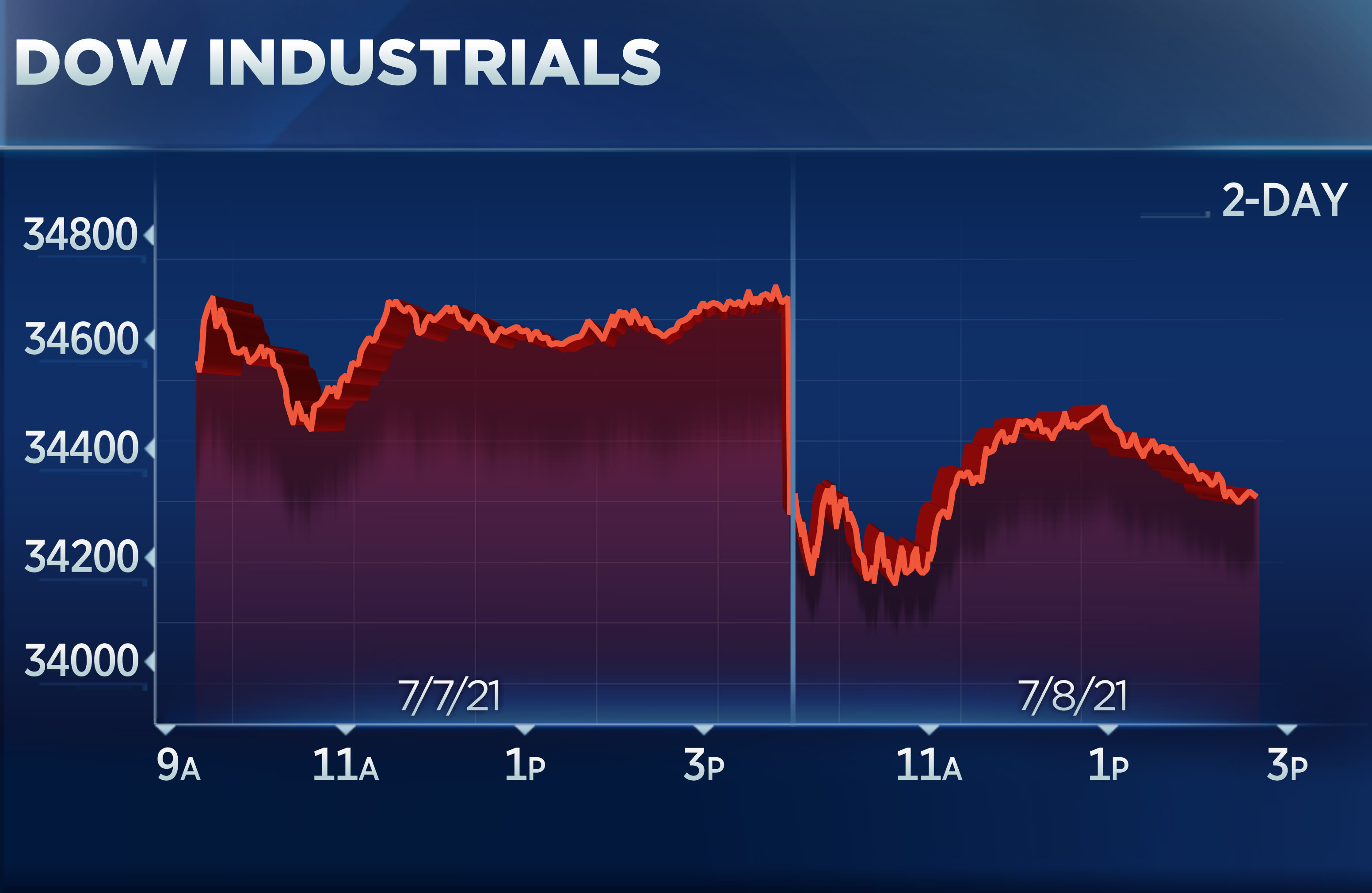
The major U.S. stock indexes fell on Thursday on concern about the global economic comeback from Covid-19. The losses came as Japan declared a state of emergency in Tokyo for the upcoming Olympics and as countries deal with a rebound in cases because of Covid variants.
The Dow Jones Industrial Average dropped about 300 points, or 0.9%. The S&P 500 lost 0.8%. The Nasdaq 100 Composite fell 0.5%. Both the S&P 500 and Nasdaq Composite closed at records in the prior session because of gains from tech shares.
The Labor Department’s latest jobless claims data came in unexpectedly higher at 373,000, signaling a possible slowdown in the the labor picture amid the Covid recovery. Economists expected to see 350,000 first-time applicants for unemployment benefits for the week ended July 3, according to Dow Jones.
Losses were led by companies that would benefit from a rapid economic comeback from the virus. Shares of Carnival and Royal Caribbean each dropped more than 1%. American Airlines and Delta Air Lines each fell 1%. Nike and Ford were also lower. Retailers Nordstrom and Home Depot lost nearly 3%.
Chip stocks also fell on concerns about the pace of the global recovery. Micron, NVIDIA, Qualcomm, Intel and Applied Materials were all off by more than 1%. Technology stocks also decline with Microsoft, Apple, Facebook and Google-parent Alphabet all in the red.
Stocks rose off their worst levels as shares of key tech stocks traded off their lows and some, including Amazon, broke into the green.
“The market has been in one of those ‘Goldilocks’ stretches when economic growth was accelerating while inflation and interest rates remained low. Increased Covid cases, particularly Delta Variants have caused concerns that the economic acceleration will slow,” said Timothy Lesko of Granite Investment Advisors. “A few weeks ago the porridge was too hot, now it seems it is too cold. With markets at all time highs and some valuations stretched there is little room for economic slowdown in this market.”
Investors rotated into the safety of Treasuries further on Thursday, pushing the yield on the 10-year Treasury to 1.25% to the lowest since late February. Despite the recovering economy and fast inflation, the 10-year Treasury yield continues to decline. It was at 1.58% to start July and hit a 2021 high of 1.78% in March. Traders remain confused about the exact reasons for the rollover in yields, with many citing concern that the best of the economic recovery may be behind us.
Bank of America, Wells Fargo, Goldman Sachs and other financial shares declined on Thursday as their profitability outlook dimmed with lower rates. JPMorgan Chase and PNC Financial were also lower.
“Nothing suggests the near slump in yields is over,” wrote Christopher Harvey, head of equity strategy at Wells Fargo, in a note Thursday. “A sharp drop below 1.25% could cause equity PMs to believe that something is wrong or broken. As a result, we see a growing possibility of a 5% selloff in equities before earnings season.”
Harvey noted he believes the buying in bonds is more technical in nature and not due to macroeconomic factors.
The Summer Olympics in Japan — which have already been delayed for a year — will ban spectators, Reuters reported on Thursday. This follows the state of emergency declaration for Tokyo by Japan to curb a wave of new Covid infections. The state of emergency will begin July 12 and run through Aug. 22, while the Games are scheduled from July 23 to Aug. 8.
Meanwhile the global Covid death toll continued to advance, exceeding 4 million on late Wednesday, as countries including India battle more transmissible variants.
The Cboe Volatility index, or ‘VIX,’ surged above the key 20 level Thursday morning and then retreated to around the 18 level.
The move lower in futures came after a positive regular session for U.S. markets led by tech stocks on Wednesday. The S&P 500 rose 0.3% to an all-time high of 4,358.13, while the Dow Jones Industrial Average advanced 104.42 points to 34,681.79. The technology-heavy Nasdaq Composite closed just above its own flatline to eke out a record close.




